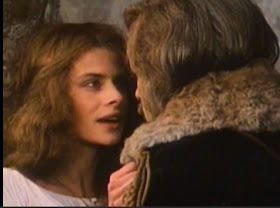Saturday, January 26, 2013
magdalene / silent night
IMDb: Father Joseph Mohr, a newly appointed priest in the town of Oberndorf (near Salzburg), meets the beautiful prostitute Magdalene. He struggles to change her situation and make a new life for her, and while doing so, they fall in love. Mohr struggles with his feelings for her, versus his commitment to God. Meanwhile, the Prior, Mohr's superior, whose corrupt dealings with the Baron von Seidl are threatened by Mohr's integrity and honesty, works (unsuccessfully) to falsely accuse Mohr of sexual misconduct with Magdalene, and thereby remove him from office. Meanwhile, Mohr and local schoolteacher Franz Gruber compose the hymn "Silent Night".
1989, Germany
Writer/Director: Monica Teuber
Cast: Nastassja Kinski
There's a trailer you can view here. At least for marketing purposes, it seems they've chosen to downplay the "this is how the beloved Christmas hymn came to be written," and emphasize certain other aspects of their story.
Friday, January 25, 2013
The Wrong Man (1956, Hitchcock, Maxwell Anderson)
I just watched The Wrong Man. Very fine little film. My friend Doug Cummings recommended it to me years ago, in the context of my Soul Food Movies project, and now I see why.
Even apart from that aspect of the film, it connects with me in a way some other Hitchcock's don't: it seems less cold, more compassionate (or at least empathetic). I like the aesthetic, too: there is the suggestion that it's influenced by the new awareness of foreign film in the mid-fifties - particularly the post-war realism of Rossellini, Satyajit Ray, perhaps Bresson.
I find it intriguing to notice that all three of those film-makers were very interested in spiritual questions, even as their aesthetic emphasized unvarnished reality. And fascinating that this sparse, essentially realist film should also be Hitchcock's most explicitly religious - though in a complex way.
Some of that faith element must be credited to the screenwriter (which is so often a glaring oversight in film criticism): playwright Maxwell Anderson, son of a Baptist preacher, whose plays include Journey To Jerusalem, Miracle of the Danube, The Eve of St Mark, Joan of Lorraine (connected with St Joan of Arc), and Lost in the Stars (based on Cry The Beloved Country).
It's easy to over-emphasize (or over-simplify) Hitchcock's Catholicism, as it is Anderson's Baptist background, but there's clearly something going on here.
*
Thinking about the film's connection to the Italian Neo-Realists or Robert Bresson, and their use not only of real locations but also non-professional actors (or "models," Bresson's preferred term), I found these notes from the TCM website:
In a February 1957 American Cinematographer article, Hitchcock was quoted as saying, "I want it to look like it had been photographed in New York in a style unmistakably documentary." According to reviews and contemporary news items, Balestrero's 74th Street home in Jackson Heights, the Stork Club, the 110th and Roosevelt Avenue police stations, Ridgewood Felony Court, and the actual courtroom used for Balestrero's trial at Queens Felony Court were used as location sites in the film. The Greenmont Sanitarium in Ossining, NY and Edelweiss Farm in Cornwall, NY were also real locations from Balestrero's story. In addition, Hitchcock filmed on Queens and Brooklyn streets at cafeterias, delicatessens and liquor stores. The American Cinematographer article reported that O'Connor's office in the Victor Moore Arcade was also used as a shooting site.
According to modern sources, Hitchcock joked that he needed to add to the film all the reality he could get, because the premise of the true story was so unbelievable. Therefore, he used real people from some of the incidents in Balestrero's life in the film. According to the American Cinematographer article, the husband-and-wife liquor store owners, a policeman, detectives and Cornwall resort owners were real people who portrayed themselves in the film. Sherman Billingsley, the well-known proprietor of the Stork Club, also appeared as himself in the film.
Sunday, January 06, 2013
jan 31 + 16 | vertigo
Good choice, Cineplex. The movie that bumped Citizen Kane from top slot on the Sight & Sound once-a-decade poll, just this past summer. Makes me eager to see it again.








